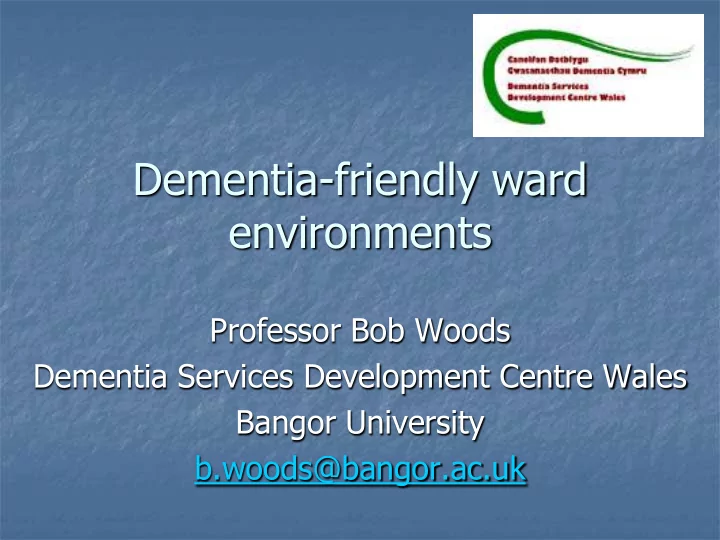

Dementia-friendly ward environments Professor Bob Woods Dementia Services Development Centre Wales Bangor University b.woods@bangor.ac.uk
Why do we need dementia- friendly environments? People with dementia may have difficulties with: Memory and learning Perception – recognition of objects / people Practical skills – feeding, dressing Judgement – understanding of the situation and what is appropriate Communication – expressing needs (including pain) and understanding others Adaptability
Why we need dementia-friendly environments - 2 The person may have difficulty managing their emotional response to their experience Fear Distress Loss Anger Panic Suspicion Denial The person‟s dementia may have been made much worse by delirium, leading to excess disability
NICE Guideline Interventions to prevent delirium Address cognitive impairment and/or disorientation by: providing appropriate lighting and clear signage; a clock (consider providing a 24-hour clock in critical care) and a calendar should also be easily visible to the person at risk talking to the person to reorientate them by explaining where they are, who they are, and what your role is introducing cognitively stimulating activities (for example, reminiscence) facilitating regular visits from family and friends.
NICE Guideline Interventions to prevent delirium - 2 Ensure hearing and visual aids are available to and used by people who need them, and that they are in good working order. Promote good sleep patterns and sleep hygiene by: avoiding nursing or medical procedures during sleeping hours, if possible scheduling medication rounds to avoid disturbing sleep reducing noise to a minimum during sleep periods.
Principles of good dementia design 1. Design should compensate for disability 2. Design should maximise independence 3. Design should enhance self-esteem and confidence 4. Design should demonstrate care for staff 5. Design should be orientating and understandable 6. Design should reinforce personal identity 7. Design should welcome relatives and the local community 8. Design should allow control of stimuli (noise, light…)
Principles into practice King‟s Fund Enhancing the Healing Environment Programme Range of resources for developing supportive design for people with dementia in hospitals „Is your ward dementia -friendly? The EHE Environmental Assessment Tool
The assessment tool domains
What can be done?
Orientation can be supported by: Artworks that reflect the seasons Calendars Large face clocks Natural light Outside spaces Photographs of local scenes Signs denoting ward and hospital name Views of nature Visible staff
Familiarity can be enabled by: Domestic scale seating and dining areas Personal and self care items Photographs and memory boxes Recognisable sanitary ware Traditional crockery and cutlery
„This is me‟
Meaningful activity can be encouraged by providing: Books and games Drinks and snacks Gardens Handrails Interactive artworks Memorabilia Places to walk Resting points Social spaces
Legibility can be aided by ensuring: Clear sight lines Discrete security measures Even lighting (bright, no glare) Matt, even coloured, flooring Noise reduction Uncluttered spaces
Way finding can be helped by using: Accent colours Artworks Identification of bays, beds and social spaces Signage – pictures and text
Interactive artwork at Kings College Hospital
Recommendations for one ward at YG 1 – short-term, inexpensive 1. A door release system be fitted, as on the adjoining ward. 2. Broken down areas of flooring to be replaced. 3. Sign-posting of key areas of the ward. 4. A range of materials for stimulation and engagement of people with dementia to be available on ward. 5. “This is me ‟ booklets to be used routinely with people with dementia. 6. Space provided for patients to have some important personal possessions / photographs to reinforce identity. 7. Alternative storage for mattresses to be provided, to free up bathroom. 8. Ensure toilet seats and hand-rails contrast with white porcelain.
Recommendations for one ward at YG 2 – medium term, some costs 8. Provide toilet facility in shower rooms. 9. Re-model toilets so that more toilets are available where staff can assist patients. 10. Provide day-space on the ward. 11. Replace flooring on the ward – non-shiny, no visual “steps”
Resources King‟s Fund EHE (Assessment tool and other resources) http://www.kingsfund.org.uk/current_projects/enhancing_the_h ealing_environment/ehe_design.html University of Stirling (Design publications e.g. on lighting) http://dementia.stir.ac.uk/design_welcome NHS Education Scotland (Dementia and acute care and A&E) http://www.nes.scot.nhs.uk/education-and-training/by-theme- initiative/mental-health-and-learning-disabilities/publications- and-resources.aspx Alzheimer‟s Society (Publications on design and other resources) http://www.alzheimers.org.uk/ „Find‟ for signs, memory boxes etc. http://www.findsignage.co.uk/ 1000 Lives plus – for „How to guide‟ for dementia care and relatives‟ survey forms (bilingual) http://www.1000livesplus.wales.nhs.uk/mh-dementia
Recommend
More recommend